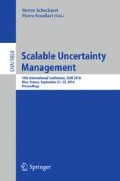Abstract
For persuasion dialogues between a software system and user, a user should be able to present arguments. Unfortunately, this would involve natural language processing which is not viable for this task in the short-term. A compromise is to allow the system to present potential counterarguments to the user, and the user expresses his/her degree of belief in each of them. In this paper, we present a protocol for persuasion that supports this type of move, and show how the system can use the epistemic approach to probabilistic argumentation to model the user, and thereby optimize the choice of moves.
Access this chapter
Tax calculation will be finalised at checkout
Purchases are for personal use only
References
Baroni, P., Giacomin, M., Vicig, P.: On rationality conditions for epistemic probabilities in abstract argumentation. In: Computational Models of Argument (COMMA 2014), pp. 121–132 (2014)
Black, E., Coles, A., Bernardini, S.: Automated planning of simple persuasion dialogues. In: Bulling, N., van der Torre, L., Villata, S., Jamroga, W., Vasconcelos, W. (eds.) CLIMA 2014. LNCS, vol. 8624, pp. 87–104. Springer, Heidelberg (2014)
Black, E., Hunter, A.: Reasons and options for updating an opponent model in persuasion dialogues. In: Proceedings of the International Workshop on the Theory and Applications of Formal Argumentation (TAFA 2015) (2015)
Caminada, M., Podlaszewski, M.: Grounded semantics as persuasion dialogue. In: Computational Models of Argument (COMMA 2012), pp. 478–485 (2012)
Cerutti, F., Tintarev, N., Oren, N.: Formal arguments, preferences, and natural language interfaces to hhuman: an empirical evaluation. In: Proceedings of ECAI 2014, pp. 207–212 (2014)
Dung, P.: On the acceptability of arguments and its fundamental role in nonmonotonic reasoning, logic programming, and n-person games. Artif. Intell. 77, 321–357 (1995)
Dung, P., Thang, P.: Towards (probabilistic) argumentation for jury-based dispute resolution. In: Computational Models of Argument (COMMA 2010), pp. 171–182. IOS Press (2010)
Fan, X., Toni, F.: Assumption-based argumentation dialogues. In: Proceedings of IJCAI 2011, pp. 198–203 (2011)
Fan, X., Toni, F.: A general framework for sound assumption-based argumentation dialogues. Artif. Intell. 216, 20–54 (2014)
Hadjinikolis, C., Siantos, Y., Modgil, S., Black, E., McBurney, P.: Opponent modelling in persuasion dialogues. In: Proceedings of IJCAI 2013, pp. 164–170 (2013)
Hadoux, E., Beynier, A., Maudet, N., Weng, P., Hunter, A.: Optimization of probabilistic argumentation with Markov decision models. In: Proceedings of IJCAI 2015 (2015)
Hunter, A.: Some foundations for probabilistic argumentation. In: Computational Models of Argument (COMMA 2012), pp. 117–128 (2012)
Hunter, A.: A probabilistic approach to modelling uncertain logical arguments. Int. J. Approx. Reason. 54(1), 47–81 (2013)
Hunter, A.: Opportunities for argument-centric persuasion in behaviour change. In: Fermé, E., Leite, J. (eds.) JELIA 2014. LNCS, vol. 8761, pp. 48–61. Springer, Heidelberg (2014)
Hunter, A.: Probabilistic strategies in dialogical argumentation. In: Straccia, U., Calì, A. (eds.) SUM 2014. LNCS, vol. 8720, pp. 190–202. Springer, Heidelberg (2014)
Hunter, A.: Modelling the persuadee in asymmetric argumentation dialogues for persuasion. In: Proceedings of IJCAI 2015 (2015)
Hunter, A., Thimm, M.: Probabilistic argumentation with incomplete information. In: Proceedings of ECAI 2014, pp. 1033–1034 (2014)
Kontarinis, D., Bonzon, E., Maudet, N., Moraitis, P.: Empirical evaluation of strategies for multiparty argumentative debates. In: Bulling, N., van der Torre, L., Villata, S., Jamroga, W., Vasconcelos, W. (eds.) CLIMA 2014. LNCS, vol. 8624, pp. 105–122. Springer, Heidelberg (2014)
Li, H., Oren, N., Norman, T.J.: Probabilistic argumentation frameworks. In: Modgil, S., Oren, N., Toni, F. (eds.) TAFA 2011. LNCS, vol. 7132, pp. 1–16. Springer, Heidelberg (2012)
Likert, R.: A technique for the measurement of attitudes. Arch. Psychol. 140, 1–55 (1932)
Prakken, H.: Coherence and flexibility in dialogue games for argumentation. J. Logic Comput. 15(6), 1009–1040 (2005)
Prakken, H.: Formal sytems for persuasion dialogue. Knowl. Eng. Rev. 21(2), 163–188 (2006)
Rienstra, T., Thimm, M., Oren, N.: Opponent models with uncertainty for strategic argumentation. In: Proceedings of IJCAI 2013, pp. 332–338 (2013)
Rosenfeld, A., Kraus, S.: Providing arguments in discussions based on the prediction of human argumentative behavior. In: Proceedings of AAAI 2015 (2015)
Thimm, M.: A probabilistic semantics for abstract argumentation. In: Proceedings of ECAI 2012, pp. 750–755 (2012)
Thimm, M.: Strategic argumentation in multi-agent systems. Kunstliche Intell. 28(3), 159–168 (2014)
Acknowledgements
This research was partly funded by EPSRC grant EP/N008294/1 for the Framework for Computational Persuasion project.
Author information
Authors and Affiliations
Corresponding author
Editor information
Editors and Affiliations
Rights and permissions
Copyright information
© 2016 Springer International Publishing Switzerland
About this paper
Cite this paper
Hunter, A. (2016). Persuasion Dialogues via Restricted Interfaces Using Probabilistic Argumentation. In: Schockaert, S., Senellart, P. (eds) Scalable Uncertainty Management. SUM 2016. Lecture Notes in Computer Science(), vol 9858. Springer, Cham. https://doi.org/10.1007/978-3-319-45856-4_13
Download citation
DOI: https://doi.org/10.1007/978-3-319-45856-4_13
Published:
Publisher Name: Springer, Cham
Print ISBN: 978-3-319-45855-7
Online ISBN: 978-3-319-45856-4
eBook Packages: Computer ScienceComputer Science (R0)

